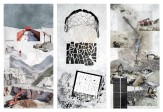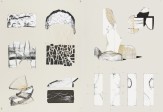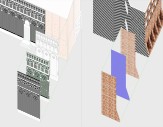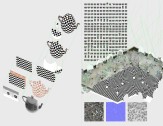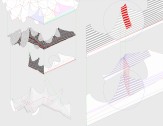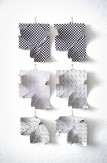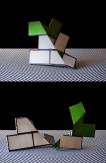MASTER OF SCIENCE IN ARCHITECTURE FALL 2023
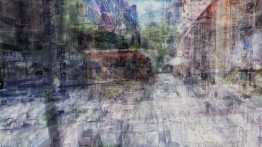
GRADUATE THESIS
Guido Zuliani, Distinguished Professor Adjunct
The unfolding of the research work that will lead to the construction and the discussion of a thesis can be framed by four fundamental questions: What, Why, for Whom, and How. The first two questions, the What and the Why of a work, direct attention to the topical moment of the Beginning, the moment of the choice of a specific topic over a set of different possibilities and the evaluation of the reasons for that choice.
In opening his 1970 inaugural lecture to the College de France, the philosopher Michel Foucault reflected on his specific position, saying:
I wish I could have slipped surreptitiously into this discourse which I must present today, and into the ones I shall have to give here, perhaps for many years to come. I should have preferred to be enveloped by speech, and carried away well beyond all possible beginnings, rather than have to begin it myself […] I should have preferred to become aware that a nameless voice was already speaking long before me, so that I should only have needed to continue the sentence it had started and lodge myself in its interstices […] Thus, there would be no beginning, and instead of being the one from whom discourse proceeded, I should be at the mercy of its chance unfolding […].
With these words Foucault expressed his uneasiness in occupying the presumed privileged role of the one that begins, the role of the one that inaugurates speaking from an empty space, an empty pre-social, pre-political space, a pure condition, the myth of which obscures the exclusions, prohibitions, and permissions that the powers inscribed in our languages administrate.
Beginnings are instead always situated, traversed, and shaped by different forces; beginnings happen already “in the midst of” what already exists, in the midst of what Edward Said called the “systems of language and cultural history.”
To paraphrase the literary historian Karen LeFevre, we can assert that beginnings have their own ecologies, and it is within these surroundings that the inception of research finds itself always compromised.
Taking into consideration these few observations, the first part of the semester will focus on exploring these ecologies considering three different scales/contexts—three different territories with three different maps, within which are situated the beginning of each thesis, the what and why of each thesis:
– The individual, biographic context—somehow an act of self-reflection and introspection that
tries to place oneself at the intersection of different socio-cultural agencies.
– The socio-political context, with particular attention to the urban and its exploding
contradictions.
– The disciplinary, understood on one side as a hinge between the subject and sociopolitical
reality, and on the other as an expanded field open today by necessity to diverse forms of
practice.
Starting from each of the proposed thesis programs, the first three weeks of the semester will be dedicated to these critical reflections expressed in terms of specific sets of physical materials—drawings and/or models—and during class discussions.
The fourth week of the semester will be dedicated to discussing and identifying the audience, and to the provisional format and media in which the project will be brought to conclusion.
The reflections developed by questioning in this way each student proposal intend to offer to the work of the entire class a broad conceptual backdrop necessary to articulate each research project as a critical stance within the field of contemporary architectural practices.
Projects
-

Murder in the Woolworth
-
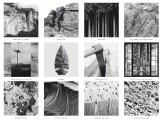
Entropy Systems
-
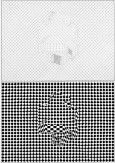
Dressing, Cladding, Mapping: Notes on Check and Stripe
Back
Murder in the Woolworth
Tsung-Han Lin
This thesis delves into the influence of manga storyboards on architectural reading experiences. What distinguishes manga from conventional architectural drawings is its ability to convey not only spatial information but also temporal dynamics. Through the strategic arrangement of panels and narrative structure, manga enables readers to perceive both space and time, facilitating a unique multi-layered comprehension of temporal sequences within architectural narratives.
Mangaka skillfully employ panels to manipulate time and provide diverse perspectives on depicted scenes. Varying panel sizes contribute to depth, with more panels capturing intricate movements while emphasizing significant actions. This temporal segmentation in manga diverges from the continuous motion of real life, allowing mangaka to either freeze sequences of movement or ingeniously depict motion through sequential images.
To illustrate the transformation of architectural drawings through manga, I used a character's journey into the Woolworth Building as a focal point. This narrative begins by intertwining architecture with the character's movements. As the story progresses, architecture undergoes a gradual metamorphosis, repetition, and distortion. This approach presents architects with a novel way of infusing temporal dimensions into architectural drawings, enabling meticulously crafted timelines by interpreting architectural narratives via manga storyboards.
Entropy Systems
Daniel Matallana
The cities we inhabit are in constant flux; buildings are constantly being built, torn down, and then built again as we attempt to manifest ephemeral visions of the future. This liminality is veiled by the supposed permanence of the structures we inhabit due to the dissonance between our daily experiences and the broader timelines of our cities.
These building practices, however, are not without consequence. Each day in New York City thousands of tons of demolition waste are created as what was once raw material is taken out to landfills where it will remain untouched until geological forces reclaim these man-made conglomerates as part of the earth. The impact of these practices has reached a level so pronounced that it has defined our geological era—identified through deposits in the sedimentary layers of the earth—as the Anthropocene.
While the typical discourse around the Anthropocene emphasizes human impact on the Earth as independent agents, we are not shielded from the repercussions. Hydraulic fracking has been found to cause earthquakes, and natural disasters have significantly increased in frequency due to climate change, forcing us to adapt our built environment to this new reality.
Acknowledging the symbiotic existence of humans within this system of forces gives us the unique opportunity to reflect on our creations through a different lens. Taking reference from the geological forces that constantly dismantle and recreate the earth, this project looks at how entropy can be a generative force when applied to the architecture around us.
Dressing, Cladding, Mapping: Notes on Check and Stripe
Yinqing Zhu
Note the dress of the maid in Pieter de Hooch’s A Woman Drinking with Two Men. As the paint fades away, we voyeurs peer through the layers and discern, uncannily, the black-and-white checkered floor underneath. In this metaphorical moment the maid is disembodied, transformed into a ghost. Where the dress is gone, what we see is not the naked female body, but the “naked” image. The female body is repressed from representation, and nudity is replaced by transparency. Here, checkered assumes a threefold symbolism: it is, simultaneously, the physical floor tiles, the instrument of perspectival space construction, and an anachronistic nod to the default setting of a digital canvas.
Dichromatic patterns, woven into dressing, cladding, and mapping, are deeply intertwined with the body, architecture, and image. Despite the enduring efforts of our discipline to actively neglect them, we are witnessing the return of the repressed in this post-digital era. Now is the opportune moment to consider the resurgence of check and stripe not just as passing fashion, but as a chance to scrutinize architectural flatness beyond what is skin-deep.
The ambition of this thesis is to establish check and stripe as the new architectural dress code by gathering the necessary terms and references for a critical understanding of these patterns, and by testing their productivity as instruments through design experiments. It takes audacity to wear check and stripe, but the reward is a new ground for design agency in the crevice between 2D and 3D, surface and body, sincere labor and gimmick.














